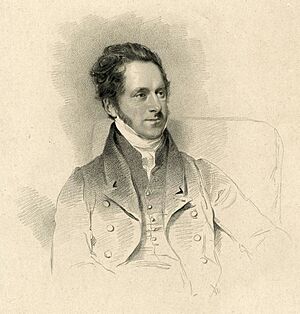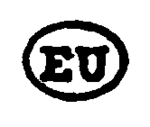Edward Vernon Utterson facts for kids
Quick facts for kids
Edward Vernon Utterson
|
|
|---|---|
 |
|
| Born | 1775/1776 |
| Died | 14 July 1856 (aged 80) Upper Brunswick Place, Hove, Brighton |
| Resting place | Fareham, Hampshire |
| Occupation | Lawyer, Literary antiquary, collector, editor |
| Language | English |
| Nationality | British |
| Education | Bachelor of Laws |
| Alma mater | Trinity College, Cambridge |
| Period | 1812–1843 |
| Spouse | Sarah Elizabeth Utterson (1803–1851) |
Edward Vernon Utterson (1775/76 – 14 July 1856) was a British lawyer, a collector of old books and writings, and an editor. He was a member of important groups like the Society of Antiquaries and the Roxburghe Club. He also held a special legal job called a Recorder in Chichester. Later, he became one of the Six Clerks in a court called Chancery until he retired. He also started his own printing company, the Beldornie Press.
Biography

Edward Vernon Utterson was born in 1775 or 1776. He was the first of eight children. His father, John Utterson, was from Fareham, Hampshire. Edward was baptized on July 14, 1777, in Gosport.
He went to Eton College for school. Then, he studied at Trinity College, Cambridge starting in 1794. He also studied law at Lincoln's Inn. In 1801, he earned a degree in law. The next year, in 1802, he became a barrister, which is a type of lawyer.
In 1803, he married Sarah Elizabeth Brown. She was a writer who translated a book called Tales of the Dead in 1813. They had several children together.
Edward worked as a lawyer in the Court of Chancery. In 1815, he became one of the Six Clerks there. This was an important job in the legal system. He kept this job until it was ended in 1842, and then he retired with his full pay.
In 1817, he was chosen as the Recorder of Chichester. This meant he was a judge in that town. His father had also held a position there before him. Edward resigned from this role in 1820. The town council was very sad to see him go. They said he had done his job with great skill and fairness.
Utterson held strong traditional political views. He lived in several places in London during his career. Around 1835, he moved to the Isle of Wight. He lived first at Buckland Grange, then built a house called Beldornie Tower. There, he started his own printing press, the Beldornie Press, in 1840.
In 1851, a new Member of Parliament was elected for the Isle of Wight. This person supported different ideas than Utterson. Because of this disagreement, Utterson decided to move away from Ryde.
His wife, Sarah, passed away on September 22, 1851. After her death, Edward held the first sale of his large book collection. Edward Vernon Utterson himself died on July 14, 1856, in Hove, Brighton. He was 80 years old. He was buried in Fareham. There are special plaques in St Thomas's Church in Ryde to remember him and his wife.
Leisure Activities

Collector
Like his father, Edward Utterson loved collecting things. He collected old books, drawings, and prints. People described him as a very important book collector. He had good taste and a lot of knowledge about books. He likely started his collection early in the 1800s.
In 1807, he became a member of the Society of Antiquaries. This group studies old things. He was also one of the first members of the Roxburghe Club. This club was founded in 1812 by 18 people who loved rare books. He remained a member until he died.
Utterson also edited several books between 1812 and 1839. Then, in 1840, he started his own printing company, the Beldornie Press. He used it to print new copies of old, important books. These books were printed in very small numbers, usually only about 12 to 20 copies. Each copy was numbered.
He gave a copy of all his reprints to a writer named John Payne Collier. Collier was very interested in old English literature. However, Collier found some mistakes in the books from Beldornie Press. He thought these errors were made by the people who copied and set the type for the books. Collier wrote about this in a newspaper in 1856, thinking Utterson had died. Utterson quickly wrote to Collier to let him know he was still alive! Collier then wrote another note, apologizing for the mistake. Even so, Collier's warning about the accuracy of the Beldornie Press reprints is still remembered today.
Artist
Edward Utterson was also a talented artist, even though it wasn't his main job. Many of his artworks are still kept in the British Museum. In 1817, he was allowed to draw from the museum's Townley Gallery. This gallery had ancient sculptures that artists could study and draw. He even met another artist, James Ward, there that year. When Utterson showed his art in 1824, people said he was good at copying the style of another artist named Thomas Stothard.
Yachtsman

Utterson owned a yacht called Iris, which was based in Ryde. He loved sailing. In 1835, he became a member of the Royal Western Yacht Squadron in Portsmouth. He was also a Trustee of the Royal Victoria Yacht Club in Ryde, on the Isle of Wight.
Sales of Collections
Because Edward Utterson was such a famous collector, the sales of his books and prints were big events. The first sale of his books lasted for eight days in April 1852. It was run by a famous auction house, Sotheby's. This sale brought in a lot of money, about £4805. After that, his collection of drawings and engravings was also sold.
The second sale of his book collection happened after he died. It lasted for seven days in March 1857. This sale also brought in a large sum, about £4050.
Legacy
A historian named Murray Pittock thinks that Edward Utterson might have inspired a famous character. He suggests that Utterson's name was used for Gabriel John Utterson. This character is a lawyer and friend of Dr. Jekyll in Robert Louis Stevenson's famous story, Strange Case of Dr Jekyll and Mr Hyde (1886).
 | Emma Amos |
 | Edward Mitchell Bannister |
 | Larry D. Alexander |
 | Ernie Barnes |


